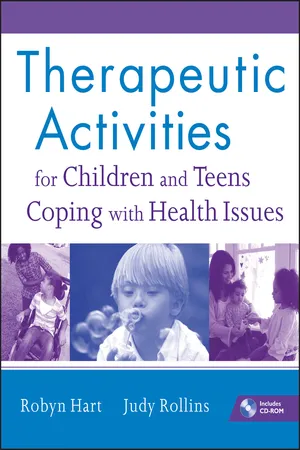
Therapeutic Activities for Children and Teens Coping with Health Issues
- English
- ePUB (mobile friendly)
- Available on iOS & Android
Therapeutic Activities for Children and Teens Coping with Health Issues
About this book
Winner of the American Journal of Nursing Book of the Year 2011 (Category: Maternal And Child Health)
Building on children's natural inclinations to pretend and reenact, play therapy is widely used in the treatment of psychological problems in childhood. This book is the only one of its kind with more than 200 therapeutic activities specifically designed for working with children and teenagers within the healthcare system. It provides evidence-based, age-appropriate activities for interventions that promote coping. The activities target topics such as separation anxiety, self-esteem issues, body image, death, isolation, and pain. Mental health practitioners will appreciate its "cookbook" format, with quickly read and implemented activities.
Tools to learn more effectively

Saving Books

Keyword Search

Annotating Text

Listen to it instead
Information

Separation Anxiety
Table of contents
- Cover
- Title Page
- Copyright
- Dedication
- Foreword
- Preface
- Acknowledgments
- Introduction
- Chapter 1: Separation and Stranger Anxiety
- Chapter 2: Self-Expression
- Chapter 3: Self-Esteem
- Chapter 4: Body Image
- Chapter 5: Group Interaction and Socialization
- Chapter 6: Desensitization to Medical Implements
- Chapter 7: Tension Release
- Chapter 8: Humor
- Chapter 9: Death and Bereavement
- Chapter 10: Culture
- Chapter 11: Isolation and Immobilization
- Chapter 12: Pain
- Chapter 13: Breathing
- Chapter 14: Teaching
- Chapter 15: Activities of Daily Living
- Chapter 16: Perceptual Motor
- Appendix A: Art Materials and Projects for Children and Other High-Risk Individuals
- Appendix B: Web Sites
- References
- Author Index
- Subject Index
- Author Biographies
- Advertisement
- Download CD/DVD content
Frequently asked questions
- Essential is ideal for learners and professionals who enjoy exploring a wide range of subjects. Access the Essential Library with 800,000+ trusted titles and best-sellers across business, personal growth, and the humanities. Includes unlimited reading time and Standard Read Aloud voice.
- Complete: Perfect for advanced learners and researchers needing full, unrestricted access. Unlock 1.4M+ books across hundreds of subjects, including academic and specialized titles. The Complete Plan also includes advanced features like Premium Read Aloud and Research Assistant.
Please note we cannot support devices running on iOS 13 and Android 7 or earlier. Learn more about using the app